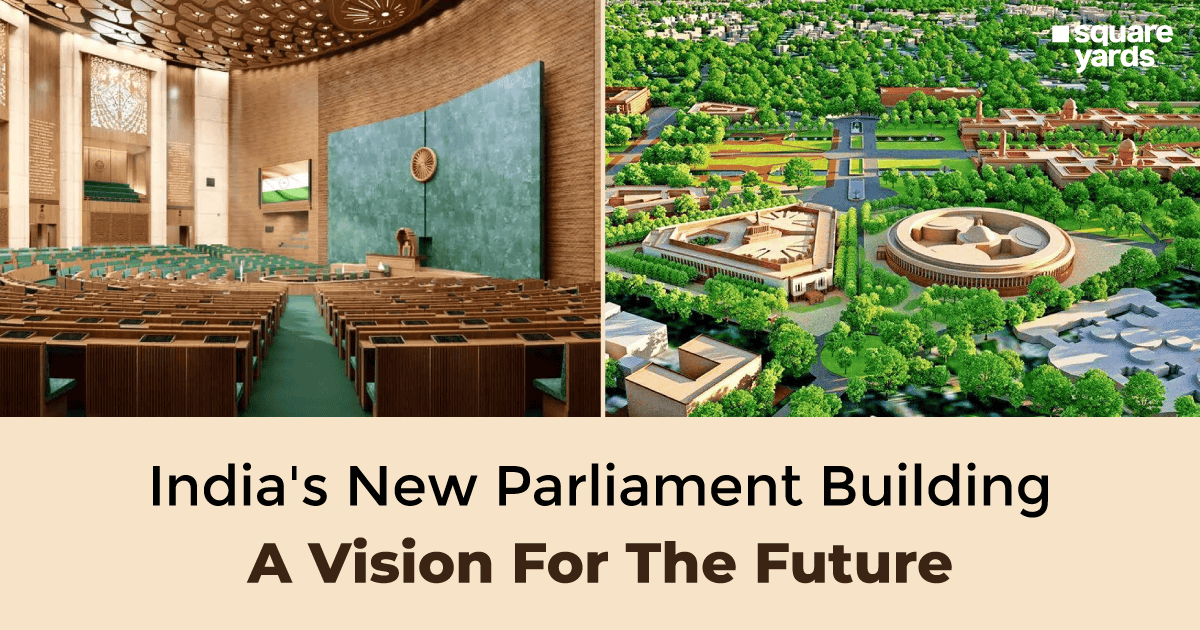When strolling around Lutyens Delhi, it is hard to miss the captivating buildings. The Parliament building has been a standing whiff of the British colonial era; after years of being the shine of Sansad Chowk, it was time to upgrade. We all have seen numerous sessions, including the galvanising union budget being announced on its premises and, most importantly, experiencing India’s first Parliament and adopting the Constitution of India.
Moving out of the colonial era, it is time to make changes that aid the increasing demand for parliamentary space.
From Blueprints to Reality
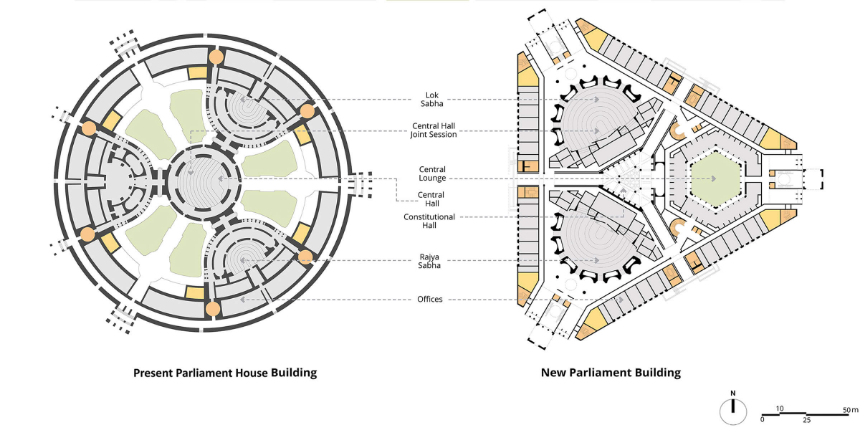
Image Source: Central Vista
After initial considerations about the right shape for the Parliament Building, its architects, Herbert Baker and Sir Edwin Lutyens, finalised the Round shape. The design of the old Parliament House was said to be inspired by the Chausath Yogini Temple in Morena, Madhya Pradesh. Similarly, the structure of the new building had to be something unique and futuristic that evolved to adapt to the increasing needs of Indian society.
The blueprint for the new Parliament building came into existence in 2019 as a part of the second phase of the Central Vista redevelopment project to enhance and upgrade Delhi. TATA Projects won the contract in September 2020 at an original cost estimated at Rs. 970 crores, which has already exceeded an estimated Rs.1200 crores.
The new construction will symbolise 140 crore Indians, with a built-up area of about 65,000 sq. mt. The triangular shape of the new structure provides optimum area utilisation. It will be able to hold larger chambers for the legislature.
The new Parliament building was inaugurated by Prime Minister Narendra Modi, on 28th May 2024.
Also Read: Golden Temple Architecture Style
Growing Need for a New Parliament Building
Back in 2015, Lok Sabha speaker Sumitra Mahajan wrote to the Union Urban Development Minister Venkaiah Naidu to consider constructing a new Parliament building that caters to the needs of the growing country. She also stated that the number of internal staff, guards, media staff and parliamentary activities in the old building had increased significantly since the building was commissioned in 1927. After serving the nation for almost 100 years and being a Grand-1 Heritage building, the Parliament of India is all set to get a major upgrade.
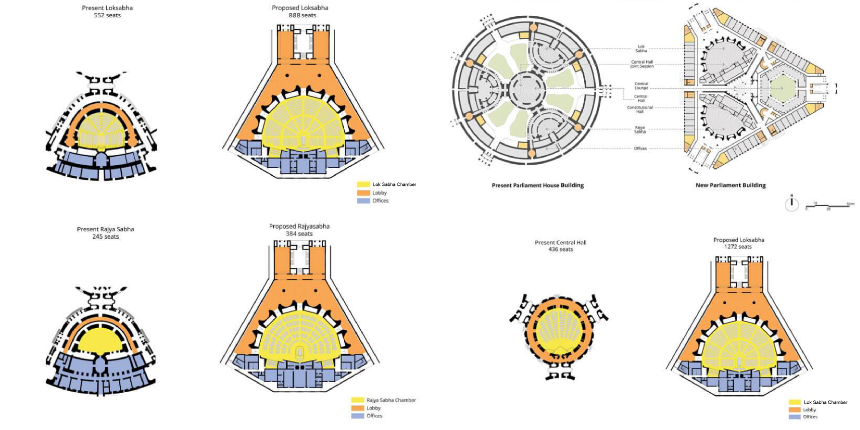
Image Source: Central Vista
Changes and alterations in the structure were ad hoc; for instance, the two new storeys, built in 1956 over the outer circular part of the edifice, obscured the dome of the Central Hall and transformed the original building’s façade. In addition, Jaali window coverings reduced natural light from entering the two Capitol halls. As such, it shows signs of ageing and overuse and can no longer meet present-day space, equipment and technology requirements.
Interiors of the New Edifice
The Union Culture Ministry has floated three committees that helped plan the massive structure’s interior design, including art installations, inscriptions and art that portrays Indian culture and society. With the national emblem sitting like a crown on the new parliament building and the ceilings embellished with fresco paintings just like you’ll see in the Rashtrapati Bhawan, the floors are also given adequate attention and dressed in beautiful hand-woven traditional carpets.
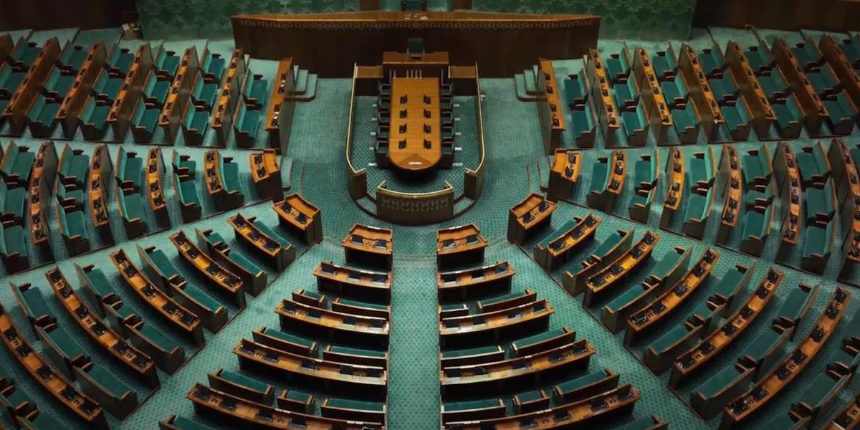
Image Source: NDTV
The National Bird of India, i.e. the Peacock, inspired the Lok Sabha interiors.
The hall is beautifully decorated with feather-like patterns made of wood to bring out the traditional essence.
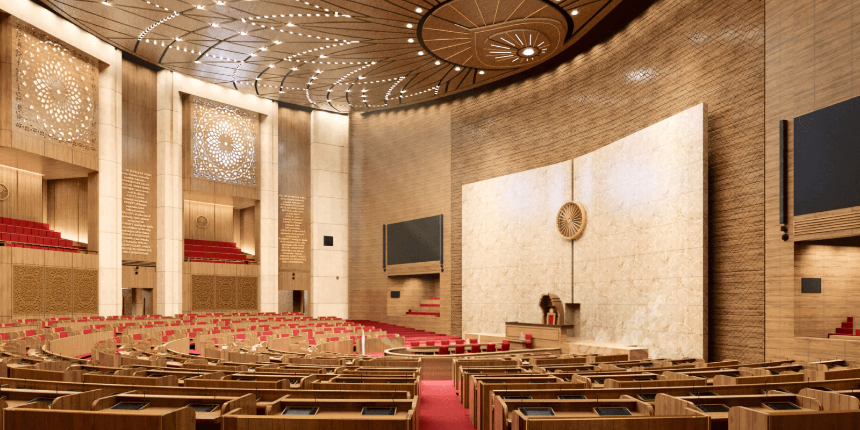
Image Source: Central Vista
The Rajya Sabha Hall in the new creation is jewelled with interiors inspired by the National flower of India, the Lotus. The new complex will have 888 seats just for the Lok Sabha chamber and 384 seats in the Rajya Sabha or the Upper House.
Unlike the old Parliament building, the Central Hall will now be the chamber to house the 1272 members in a joint session. The Central courtyard or lounge area theme will be based on the National Tree- Banyan.
To create something that stands out in the name of innovation and advancement yet something that reflects our culture, the walls of this triangular Parliament house will savour shlokas inscribed on them with tranquillity.
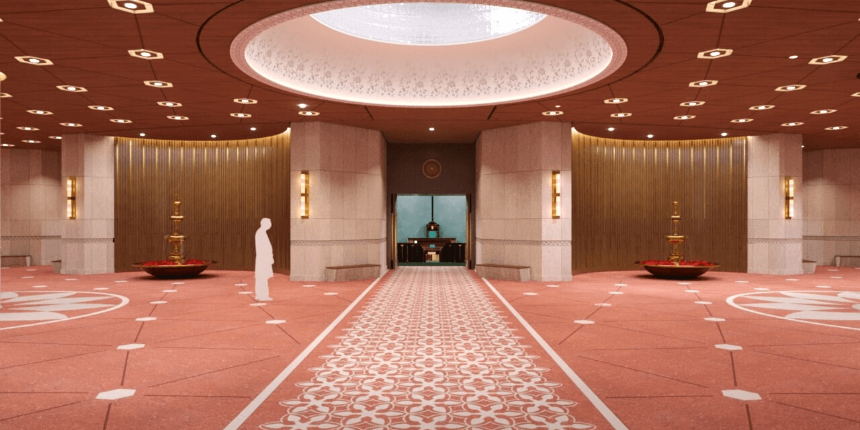
Image Source: Central Vista
Embraced with a signature statue at the entrance of the new Parliament building, a constitutional gallery showcasing the whole history of India—a walk through the ages on democracy and an array of artwork that states what the culture and art are to India—will be among a few things that make the interiors of the constitutional building much more exhilarating.
Eyeing the Future
The new Parliament building will play a major role in making Parliamentary sessions much smoother and more fruitful, and it will stand as a beacon to represent what India truly is! With the growing needs of this nation, a Platinum-rated green edifice safeguarding the 73-year-old Constitution of India will continue to be known as the symbol of India’s commitment towards environmental sustainability.
